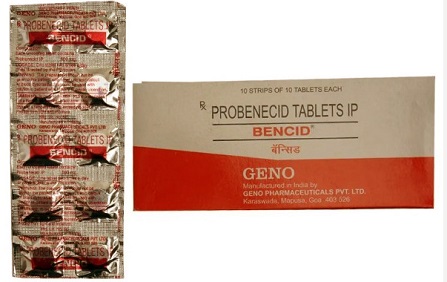Nikhil Prasad Fact checked by:Thailand Medical News Team Nov 20, 2024 4 months, 3 weeks, 1 day, 21 hours, 57 minutes ago
Medical News: Respiratory Syncytial Virus (RSV) is a common and contagious virus that poses a significant health risk, particularly to infants, older adults, and those with compromised immune systems. While treatments for RSV are limited, researchers from the University of Georgia, TrippBio, Inc., and Florida Atlantic University have uncovered a promising potential therapy using an existing drug - probenecid. Known primarily for treating gout, probenecid has demonstrated antiviral properties that could inhibit RSV replication.
 Probenecid Found to Inhibit Respiratory Syncytial Virus Replication
Probenecid Found to Inhibit Respiratory Syncytial Virus Replication
This
Medical News report explores the findings of a recent study where researchers investigated the mechanisms through which probenecid suppresses RSV replication in human respiratory cells. The study holds potential for expanding antiviral therapies for RSV and related viruses.
The Study: How Probenecid Impacts RSV Replication
Probenecid's ability to inhibit RSV was tested in human lung epithelial cells (A549). RSV typically hijacks host cell pathways to replicate, triggering harmful inflammatory responses. The research focused on probenecid’s effect on specific cellular pathways involved in RSV replication, particularly the Mitogen-Activated Protein Kinase (MAPK) pathways, which include the ERK and JNK subfamilies.
Key findings of the study showed that probenecid successfully blocked the activation of ERK and JNK pathways. These pathways are essential for viral replication as they regulate transcription factors like c-Jun and HNF-4, which the virus exploits. By preventing the phosphorylation (activation) of these pathways, probenecid essentially disrupted the virus’s ability to replicate and spread within the host cells.
The MAPK Pathways: A Closer Look
The MAPK pathways are critical for various cellular processes, including inflammation and apoptosis. During RSV infection, the virus activates these pathways to suppress the host’s immune defenses while promoting its own replication. In particular:
-ERK Pathway: This pathway contributes to inflammation and delays apoptosis, allowing RSV-infected cells to survive longer, which benefits viral replication.
-JNK Pathway: This pathway regulates proteins like c-Jun, which enhance viral RNA production and inflammatory responses.
Probenecid was found to inhibit both pathways effectively. In cells treated with probenecid, the phosphorylation of ERK and JNK was significantly reduced, limiting the virus’s ability to commandeer these cellular processes.
Experimental Methods and Results
The study utilized advanced techniques such as auto-Western blotting to assess the levels of key proteins involved in the RSV replication cycle. The results were compelling:
-ERK and JNK Inhibition: RSV-infected cells treated with probenecid
exhibited reduced phosphorylation of ERK and JNK proteins compared to untreated cells.
Impact on c-Jun and HNF-4: Probenecid treatment reduced the activation of c-Jun, a transcription factor essential for RSV replication. Additionally, it restored HNF-4 protein levels, which are typically repressed during RSV infection.
The research highlighted that probenecid’s dual impact on antiviral and anti-inflammatory pathways creates a hostile environment for RSV, curtailing its replication.
Probenecid’s Broader Antiviral Potential
Probenecid’s effects extend beyond RSV. Previous studies have shown its efficacy against other respiratory viruses, including SARS-CoV-2 and influenza. This broad-spectrum activity suggests that probenecid targets shared host cell pathways critical for various viral infections, rather than the viruses themselves. This approach minimizes the risk of resistance developing, a common issue with direct-acting antivirals.
In human trials, probenecid reduced viral load and improved recovery times for mild-to-moderate COVID-19 cases. These findings bolster its potential as a multipurpose antiviral agent.
Implications for Treatment and Future Research
The implications of this study are significant. By repurposing an FDA-approved drug like probenecid, researchers have paved the way for a potentially cost-effective and widely available treatment for RSV. The findings also open doors for further exploration of probenecid’s applications against other viruses that exploit similar cellular pathways.
Future studies should investigate the long-term effects and optimal dosing strategies for probenecid in RSV-infected individuals. Additionally, clinical trials will be crucial to confirm its safety and efficacy in broader patient populations, including vulnerable groups like infants and older adults.
Conclusion
Probenecid has emerged as a promising antiviral agent, demonstrating the ability to inhibit key pathways required for RSV replication. By targeting the MAPK pathways and reducing the activation of proteins like ERK, JNK, and c-Jun, probenecid disrupts the virus’s life cycle while mitigating inflammation. This dual action could position probenecid as a valuable tool in the fight against RSV and other respiratory viruses.
The findings underscore the importance of exploring repurposed drugs to address unmet medical needs in virology. As researchers continue to unravel the mechanisms behind probenecid’s efficacy, its role in combating viral infections may expand.
The study findings were published in the peer-reviewed International Journal of Molecular Sciences.
https://www.mdpi.com/1422-0067/25/22/12452
For the latest on RSV infections, keep on logging to Thailand
Medical News.
Read Also:
https://www.thailandmedical.news/news/respiratory-syncytial-virus-infections-in-infants-causes-a-variety-of-long-term-health-issues-later-in-life
https://www.thailandmedical.news/news/early-childhood-rsv-infection-leads-to-lifelong-immune-changes-in-the-gut-and-lungs
https://www.thailandmedical.news/news/italian-researchers-warn-that-common-respiratory-rsv-infections-are-a-threat-to-the-brain
https://www.thailandmedical.news/news/jak-stat-pathway-identified-as-a-therapeutic-target-in-respiratory-syncytial-virus-rsv-infections
https://www.thailandmedical.news/news/medical-news-respiratory-syncytial-virus-rsv-infects-nerve-cells-directly-and-can-cause-a-variety-of-long-term-neurological-issues
https://www.thailandmedical.news/news/breaking-american-and-argentinian-scientists-find-that-the-human-respiratory-syncytial-virus-rsv-is-rapidly-mutating-to-evade-vaccines
https://www.thailandmedical.news/news/breaking-scientists-discover-new-circulating-rsv-virus-variants-that-is-causing-prolong-infection-especially-among-infants-and-young-children
https://www.thailandmedical.news/news/breaking-university-of-glasgow-discovers-new-pathogen-that-can-evade-immune-system-comprising-of-fused-rsv-and-influenza-virus-particles
https://www.thailandmedical.news/news/probenecid-shows-promise-against-respiratory-virus-human-metapneumovirus-hmpv
